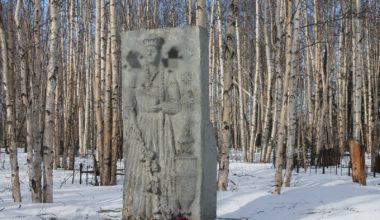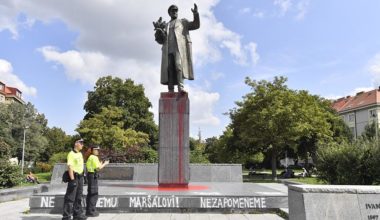Dear Subscribers,
This is an official newsletter from Remembrance, Research and Justice: Heritage of WWII in the 21st century, an interdisciplinary research project. If you received this letter from a friend and have not yet subscribed, you can easily do it HERE. If you are reading this on our website, we would appreciate if you share our link in social media. Click HERE to read the precious issue.
Earlier in May 2020, one event that was in our spotlight was, of course, the 75th anniversary of the victory over Nazi Germany. The atmosphere on this great day was not at all festive, with some countries taking a chance to expose and accuse “Soviet totalitarianism” on the occasion. Moreover, political statements went together with barbaric acts against Soviet war memorials, the glorification of Nazi collaborators, and anti-Semite acts.
Political Declarations
On May 7, 2020, a joint statement by foreign ministers of the United States, Bulgaria, Czech Republic, Estonia, Hungary, Latvia, Lithuania, Poland, Romania and Slovakia appeared on the official U.S. State Department website. Technically a tribute to the 75th anniversary of the end of WWII, the statement was, for a large part of it, devoted to “Soviet totalitarianism”. It did not mention the role the Soviet Union played in the defeat of Nazi Germany. Instead, it shifted responsibility for unleashing WWII on the Soviet Union and Nazi Germany alike.
The trend to politicize the VE-Day anniversary through an anti-Soviet and anti-Russian lens developed into an absurdist series of consequent declarative acts, including the joint statement by Presidents of Latvia, Lithuania and Estonia (May 7, 2020), declarations adopted by the Latvian Saeima (May 7, 2020) and the Lithuanian Seimas (May 8, 2020), the statement by the Estonian defense minister (May 8, 2020), and the statements by the Estonian and Latvian foreign ministers during the UN Security Council session. We have summarized all statements of that kind in our ultimately comprehensive review.
Another such declaration was about to be adopted by the Ukrainian Parliament. However, it was not, since the Servant of the People presidential political party abstained from voting or even voted ‘no’, which resulted in the lack of the votes needed. On the mutiny aboard the country’s political flagship, read HERE.
Some in Germany also found the VE-Day anniversary ‘controversial’. The leader of the far-right Alternative for Germany said he was against any celebrations on the day of liberation from National Socialism since, for him, the 8th of May was “the day of absolute defeat”. Unlike in Eastern Europe, such an opinion is not considered to be mainstream, which is seen from President Frank-Walter Steinmeier’s speech. Germany does not agree with the idea to lay responsibility for unleashing WWII and the Holocaust on anyone except the Nazi regime, which appears from the article of May 7, 2020 by German foreign minister. A position like that raises anger in Eastern European authorities: Polish Foreign Ministry spokesmen have already criticized the German minister for ‘simplifying’ history.
Attacks on Soviet war memorials
The anniversary of the victory over Nazi Germany was marked with a wave of barbaric acts committed against Soviet war memorials. In Czech Republic, unidentified vandals set up a toilet sink where Marshal Ivan Konev monument had been dismantled a month before. In Latvia, a monument to Soviet war pilots was desecrated; in Ukraine, nationalists “de-communized” Soviet war memorials in Slaviansk. Other discouraging developments took place in Germany where neo-Nazis covered the memorial, standing at the place of a destroyed synagogue, with swastikas.
On the verge of the 9th of May celebrations, Russian Defense Ministry published statistics on the acts of vandalism committed against Soviet military graves and the destruction of Soviet war memorials in Poland. Since early 2020, there have been four attacks on Soviet military graves in that country, two monuments destroyed. However, one of the monuments to Soviet soldiers was saved by a local resident. Another small victory belongs to KURSK, a Polish non-governmental organization, which successfully initiated a criminal case on the destruction of Soviet military grave in Trzcianka, Poland in 2017.
The glorification of Nazi collaborators
The glorification of Nazi collaborators was another thing Eastern European countries could not avoid these days. In his public speech on May 9, 2020, President of Ukraine Volodymyr Zelenskyy praised, as the country’s national pride, a journalist who worked for a collaborationist anti-Semite newspaper. On May 8, 2020, the Latvian defense minister, in a demonstrative gesture, laid flowers to the Latvian SS legionnaires memorial. In the center of the Lithuanian capital, Wehrmacht-uniform-clad bikers were cruising in the streets, to the sound of Nazi marches, on the 9th of May. In Odessa, Ukraine, the far-right groups, after paying tribute to the OUN, UPA and SS-Galizien on the Victory Day, clashed with the locals who gathered neat the Monument to the Unknown Seaman, with the Odessa police passively standing nearby, in the interest of the neo-Nazis. On the other hand, in the town of Kherson the law enforcement agencies detained two neo-Nazis who were preparing provocative actions on the Victory Day, making it possible to instantly solve another case, the arson in a synagogue three weeks before.
Another case of Nazi proxies’ glorification – though out of misconception – took place in the Balkans, too. The North Macedonian Post marked the 9th of May by issuing a stamp with depicting the pro-Nazi Independent State of Croatia. After Serbia voiced diplomatic protest, the North Macedonian authorities apologized.
The persecution of memory
Traditionally, those who disagree with historical revisionism regarding WWII fall under Eastern European repressive laws. Just before May 9, President of Lithuania decided to strengthen the Soviet uniform wearing ban. In Ukraine, where such law has long been in force, a criminal investigation was opened against an old-aged retired person who posted self-made celebratory Victory Day leaflets. On the very day of May 9, Facebook social network started to ban many of its users for a photo of a red banner over the Reichstag.
Controversy in Tver
Unfortunately, some controversies also took place in Russia. In Tver, days before May 9, memorial plates to victims of Stalinist terror – Soviet citizens and Polish PoWs shot in 1940 – were dismantled under some far-fetched pretext. These acts were met with a written condemnation by a group of academicians, corresponding members and professors of the Russian Academy of Sciences. Remembrance, Research and Justice: Heritage of WWII in the 21st century team supports the authors of the open letter, believing it to be inappropriate to destroy the memory of Stalin’s terror and asking to restore the terror victims’ memorial plates, where they were and as soon as possible.
New articles on our website
Early in May 2020, a number of interesting works appeared on our website. Artyom Kirpichyonok reveals the sentiments in Iraqi Kurdistan in the time of the Holocaust and WWII. Polish researcher Marian Surma explains who is buried in the UPA grave on Mount Monastyr in Poland (the one for which the Ukrainian president wants the tombstone to be restored by the Polish authorities). Alexander Dyukov from the Institute of the Russian History, the Russian Academy of Sciences, comments on the international legal aspects of the Finnish foreign ministry statement on the criminal case opened by Russia’s Investigative Committee on the crimes of Finnish occupiers in Karelia.
We try to give the fullest coverage possible of all topics related to the issues of WWII remembrance, checking the veracity and correctness of all information presented here. Please re-send this letter to your friends and ask them to subscribe if you agree that we are doing an important job. For more detail on the Remembrance, Research and Justice: Heritage of WWII in the 21st century, click HERE; we are open for cooperation and will be glad to get some feedback from you, as well as analytical and debatable articles within our format.


